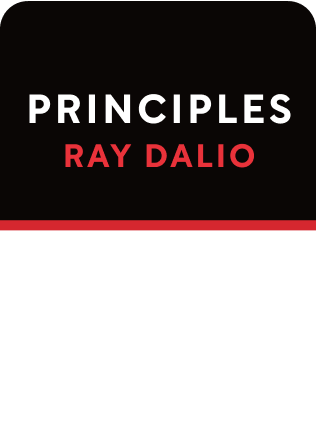

This article is an excerpt from the Shortform summary of "Principles: Life and Work" by Ray Dalio. Shortform has the world's best summaries of books you should be reading.
Like this article? Sign up for a free trial here .
Is Ray Dalio’s Principles: Life and Work worth reading? What is the key message you can take away from the book?
In his book Principles: Life and Work, billionaire Ray Dalio discusses the experiences, lessons, and practices that shaped the guiding principles powering his success. His book is a guide to rational thinking. The main theme is that finding the truth is the best way to make decisions, and that ego and emotion prevent you from discovering the truth. Dalio shares his major strategies to circumvent these weaknesses.
In this article, we’ll review Ray Dalio’s Principles: Life and Work. We’ll take a look at the book’s background, impact, and critical reception.
About the Author
Ray Dalio is the founder, co-chairman, and co-chief investment officer of Bridgewater Associates, the largest hedge fund in the world. He grew up in a middle-class neighborhood in Long Island and began playing the stock market at age 12. He started Bridgewater out of his apartment in New York in 1975 and enjoyed some success before he made some erroneous market predictions that caused him to lose everything in 1982.
This experience of failure taught Dailo not to be overconfident, to gain a more complete view of economic history, and to find ways to balance low risk with high returns. The experience also ultimately led him to develop some unconventional investment and management strategies that led to Bridgewater’s success. We’ll discuss these strategies in more detail later in the guide.
A self-described “hyperrealist,” Dalio relies on his experiences, exhaustive research, and his extensive knowledge of past economic events to help him recognize patterns, make predictions, and formulate strategies that have paid off. As of June 2021, Bridgewater manages around $150 billion while Dalio has a net worth of $20.3 billion and ranks #88 on the Forbes list of billionaires. Some have called him the “Steve Jobs of investing” for his innovative approach to finance, popularizing industry-changing strategies like risk parity and portable alpha. In 2012, he was featured in TIME Magazine’s list of the 100 Most Influential People. He was also part of the Bloomberg Markets list of 50 most influential people.
Connect with Ray Dalio:
The Book’s Publication
Principles: Life and Work, published by Simon and Schuster in 2017, is a collection of principles that Dalio gathered over the course of his career. A strong believer in systems and automation, Dalio wrote down solutions to problems and scenarios that cropped up again and again, and eventually collated them into a hundred-page text that became required reading for Bridgewater’s employees.
In the introduction to Principles, Dalio writes that he planned to share his principles in two installments: The first book would contain life and work principles, while the second (Principles of Navigating Debt Crises, released in 2018) would be about economic and investment principles.
Historical Context
Dalio believes that the same thing has always happened and will continue to happen throughout history: a cycle where there are periods of prosperity and everything works in harmony and periods of severe imbalances in power and wealth that lead to unrest and, eventually, a change in the world order. Recognizing the cause-and-effect relationships of economic events through the decades, Dalio gained a unique perspective that enabled him to find ways to weather virtually any kind of storm.
In 2007, Dalio saw signs that the U.S. financial system was heading for collapse, and he sent out a memo to clients and policymakers to warn them of the impending recession. He closely studied the Great Depression and other similar periods then based Bridgewater’s strategy (long safe assets like sovereign bonds and gold, together with short risky assets) on his findings. The tactic worked—when the recession hit in 2008, Dalio writes that their flagship fund earned 14%, while the market as a whole lost over 30%. (Reports say that other hedge funds averaged a 19% loss.)
After emerging from the 2008 to 2009 financial crisis unscathed, Dalio found himself in the spotlight. Many saw him as some sort of financial clairvoyant, but he attributed his success to the Bridgwater culture. He thus decided to share his principles online in 2010. This free precursor to the book was downloaded over three million times.
Intellectual Context
Principles falls under the broad category of books by well-known business people about the strategies behind their success. Similar books in the genre, which we’ll draw from throughout this guide, include:
- Zero to One—Paypal co-founder and venture capitalist Peter Thiel writes about the importance of creating new things, instead of simply refining what already exists. Like Dalio, Thiel is an advocate of technology but also believes that it should work alongside humans, rather than replace them.
- Creativity, Inc.—while Dalio writes about Bridgewater’s culture of extreme transparency, Pixar Animation Studios co-founder Ed Catmull writes about the strategies for building and sustaining a culture of creativity.
- High Output Management—like Dalio, former Intel CEO Andrew Grove sees the workplace as a system and writes about how to apply manufacturing principles to management.
Reviewers have also described Principles as a “modern-day Meditations,” comparing it to the classic text on Stoicism by Marcus Aurelius. Like Dalio, the Roman emperor stressed the importance of logic over emotion.
The Book’s Impact
Principles landed at #1 on the New York Times Best Seller list and was also the #1 Amazon Business Book of the Year. It’s sold over two million copies and has been printed in 34 languages.
After publishing Principles, Dalio released three other books: Principles for Navigating Big Debt Crises, Principles for Success—a condensed, illustrated version of Principles: Life and Work that was marketed for readers six to 60 years old and beyond—and The Changing World Order: Why Nations Succeed and Fail.
In 2019, Dalio launched a free application called Principles in Action. The app contains the full text for Principles: Life and Work as well as features like interactive videos, case studies, and a digital “coach” that helps you find solutions to life and work problems.
Critical Reception
Positive reviews say Ray Dalio’s Principles is well-organized and insightful, giving readers a clear picture of how Dalio made his billions. The New York Times describes the book as “instructive and surprisingly moving.”
Critical reviews say that there is no scientific basis behind Dalio’s principles and that he relies on pseudo-science. For instance, he differentiates between left-brained and right-brained thinking, a myth that has been debunked by research.
Neither is there any proof that the principles are directly responsible for Bridgewater’s investment success. In fact, The Wall Street Journal argues that Bridgewater might even be more successful if the firm didn’t adhere to the principles, which the publication describes as “dangerously reductive” (seeking to turn people into emotionless automatons) and contradictory. For example, Dalio stresses the importance of evidence-based decision-making, while also using the Myers-Briggs Indicator Type, a dubious personality test that has no sound basis on psychology. Another New York Times review also highlights the contradictions at the firm—while Dalio preaches “radical transparency,” Bridgewater keeps some things shrouded in secrecy.
In a lengthy review, Current Affairs opines that Dalio is an example of a successful man mistaking wealth for wisdom and that his principles are actually problematic. The review criticizes Dalio’s “silly” visualizations, his “inhuman” view that emotions are a kind of weakness that you need to eliminate, and his license to suspend the principles (what he calls enacting “martial law”) as he sees fit.
Commentary on the Book’s Organization
The book is divided into three parts:
- A short autobiography of how Dalio became an investor and built Bridgewater. This explains how he developed his principles.
- Life principles: the fundamental principles by which he conducts his life and business. These are universal and can be applied to nearly any situation by anyone.
- Work principles: the specific principles that underlie how Bridgewater operates. These build on the life principles. In sum, Bridgewater operates with extreme transparency, using productive conflict among independent thinkers to have an environment where the best ideas win, thus leading to optimal decision-making.
Dalio mentions some themes repeatedly, such as total receptivity, overcoming your ego, and the five-step process for getting what you want.

———End of Preview———
Like what you just read? Read the rest of the world's best summary of Ray Dalio's "Principles: Life and Work" at Shortform .
Here's what you'll find in our full Principles: Life and Work summary :
- How Ray Dalio lost it all on bad bets, then rebounded to build the world's largest hedge fund
- The 5-step process to getting anything you want out of life
- Why getting the best results means being relentlessly honest with everyone you work with






